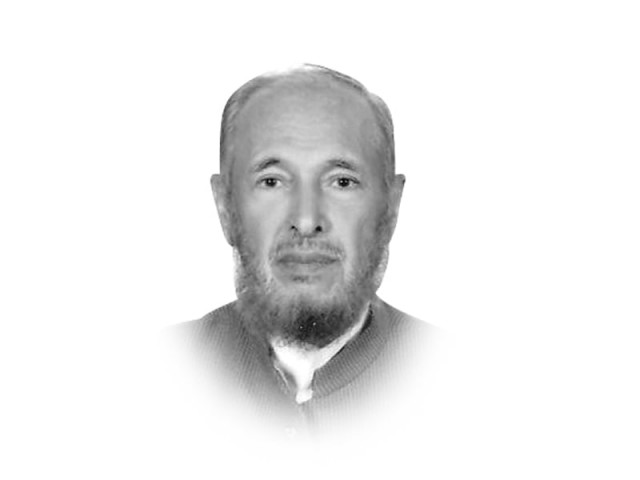There will be no ‘zero option’ in Afghanistan
With the departure of most coalition forces, many influential tribal and political leaders would switch loyalties.

The writer has served as ambassador to Afghanistan and chief secretary of Khyber-Pakhtunkhwa. He is a nominee of the Government of Pakistan in talks with the TTP
In some ways many opportunities for reconciliation have been missed. The principal reason of this was either due to the insistence by the coalition forces on the resistance of accepting the status quo and getting integrated into the systems that were in place or for insisting to accept external military presence on Afghan soil in return for continued economic and military assistance.
This attitude is still evident as the drawdown of international forces is projected to start in the next few months. Those who advocate this course believe that the country has a constitution and an elected Parliament that cannot be bypassed in negotiations for an end to the insurgency. This argument is faulty for two reasons. Firstly, questions still hang on the validity of the 2009 election. The UN chief representative in Afghanistan, when alleged that huge malpractices had taken place in the polls, had to quit. A large segment of population was disenfranchised because of their political or ideological affiliations. Secondly, when the choice is between saving the unity and integrity of the country or accepting the supremacy of the institutions like the Parliament, which is a better option to pursue?
But there is another angle to this line of argument. Both the constitution, as well as the objective of safeguarding the unity of the country, could be taken care of in a comprehensive and all-encompassing reconciliation that would not be premised on the exclusion of any group. At the same time, no government could be contemplated to emerge without the resistance being an integral component of such an arrangement.
There is another equally formidable stumbling block to the reconciliation in Afghanistan. A small but powerful lobby would like the status quo to continue indefinitely. This class of proponents of the current systems comprises the contractors, transporters, governors, ministers and hundreds of newly rich directors of the innumerable NGOs that are operating in the country. This cadre of new millionaires have benefited hugely from the billions of dollars that have poured into the country following the advent of the coalition forces and the execution of many development projects in the last 12 years. These ‘enterprising’ politicians/mandarins have been an integral part of the culture of corruption that unfolded in a country.
Such being the complexity of the situation, it is not surprising that Afghan President Hamid Karzai has been demanding that the US engages with the resistance in reconciliation talks before he would agree to sign the Bilateral Security Agreement (BSA). Undoubtedly, the Afghan leader in the waning days of his presidency is trying desperately to regain some of his lost prestige and honour in the eyes of the Afghan people by standing up to the US on a matter that he knows would be resolved as soon as a new president takes charge.
Paradoxically, while there is lot of rhetoric on peace endeavours, there is scant attention to addressing the root cause of the conflict. There is an overwhelming emphasis on signing the BSA. But the plain fact is that any new incumbent president would sign the agreement as soon as he assumes office. There will be no ‘zero option’ because the US would not like to see its scheme unravel in Afghanistan as soon as Nato forces depart. All presidential the front runners are committed to signing the security agreement.
What would signing the BSA deliver? It would provide a ‘legal’ cover to the continued presence of foreign forces for another 10 years beyond 2014. It would also enable the US to retain control of nine military bases in Afghanistan. Further, the agreement would give immunity to Nato soldiers from being prosecuted for actions they would be involved in during the course of their duty in Afghanistan. More importantly from Kabul’s point of view, the accord would help it receive financial assistance that is critical for maintaining its security forces numbering 350,000.
What is important, however, is that the insurgency would not abate because external forces would stay in the country and their presence constitutes the biggest single reason for the conflict in the country. If more than 80,000 foreign forces could not defeat the insurgency, 15,000 should not be expected to produce any miracles. More worrying is the prospect of significant rise in the rate of desertions from the Afghan Army. Currently, an annual 10 per cent desertion rate exists within members of security forces (the rate of attrition was 20 per cent two years ago). If this figure would jump to 30 or 40 per cent, there would be the danger of the disintegration of the security infrastructure of the country. With the departure of most coalition forces, many influential tribal and political leaders, seeing the writing on the wall, would take no time in switching loyalties. That would, in the worst-case scenario, create conditions for a more pervasive insecurity and lawlessness, forcing many Afghans to wonder whether a ‘messiah’ was needed to stem the rot and restore some semblance of peace and security in the war-torn country.
Published in The Express Tribune, April 19th, 2014.
Like Opinion & Editorial on Facebook, follow @ETOpEd on Twitter to receive all updates on all our daily pieces.














COMMENTS
Comments are moderated and generally will be posted if they are on-topic and not abusive.
For more information, please see our Comments FAQ